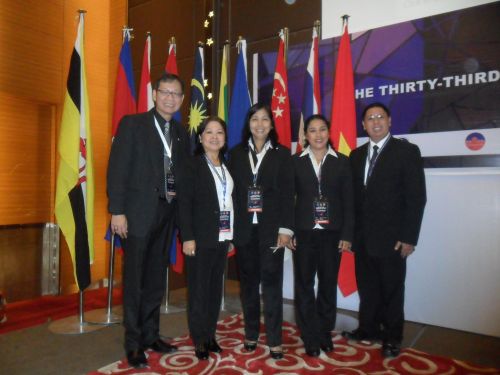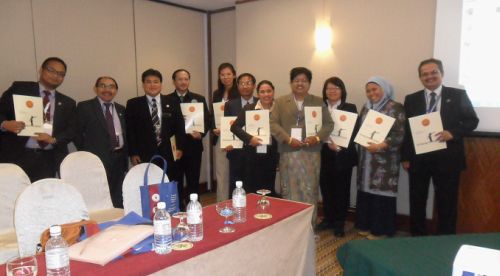The ASEAN Training Center for Preventive Drug Education (ATCPDE) once again participated as a member of the Philippine delegation to the 33rd Meeting of ASEAN Senior Officials on Drug Matters (ASOD) held in Kuala Lumpur, Malaysia on September 24-26,2012.
Prof. Francis Grace Duka-Pante, ATCPDE’s OIC Director, joined the officials from the Dangerous Drugs Board headg sed by DDB Secretariat OIC Benjamin P. Reyes, Preventive Education, Training and Information Division Chief Teresita C. Pineda, and Policy Studies, Research and Statistics Division Chief Virginia P. Balmes. Also part of the delegation is Commissioner Earl P. Saavedra of the National Youth Commission.
The Meeting was officially opened by Hon. Dato’ Alwi Bin Haji Ibrahim, Malaysia’s Deputy Secretary General (Security), Ministry of Home Affairs who expressed his hope that the 33rd ASOD would facilitate discussions to produce concrete actions in addressing the alarming threat in the region. Bearing in mind the strict time frame for the realization of a Drug-free ASEAN, he encouraged further action-oriented collaboration and cooperation among ASEAN Member States.

Virginia Balmes, Francis Grace Duka-Pante and Earl Saavedra.
The meeting was chaired by Hon. Puan Sri Dato Zuraidah binti Hj. Mohamed, Director General of Malaysia’s National Anti-Drugs Agency (NADA).
1. Country Presentations
Some major points shared by the member states are the following:
- importance of cross border cooperation with the example of how concerted efforts mitigated the security threats in the Upper Mekong River
- information sharing, on preventive education and awareness raising programmes targeting schools and public would be effective in reaching out to a wider audience
- capacity building for criminal justice officials, such as prosecutors and judges, in addition to the law enforcement officials ensured effectiveness in taking punitive measures on drug trafficking and drug related crimes; and
- voluntary treatment centres such as Cure and Care of Malaysia were being recognized by international organizations such as UNODC and WHO.
2. Report on Mid-Term Review on the Achievements of ASEAN Vision: Drug-free ASEAN 2015
The Indonesian research team headed by Ms. Sabarinah Prasetyo presented the results of the mid-term review. One crucial finding is the successful demand reduction efforts in member states although there is still a need to conduct life skills trainings and parenting seminars.
3. Working Group Reports
Working Groups were held on treatment and rehabilitation, law enforcement, research, alternative development and preventive education. Below are some of the salient recommendations:
A. Treatment and Rehabilitation
- initiate a regional project on ASEAN Best Practices on Treatment, Rehabilitation and Aftercare for drug abusers/dependents;
- enhance capacity building towards competency of personnel in treatment and rehabilitation;
- establish Regional Treatment and Rehabilitation pool of experts (Subject Matter Experts)
B. Law Enforcement
- strictly control the pseudoephedrine and other pharmaceutical products;
- comply with the recommendations from the ASEAN Special Ministerial Meeting on Drug Matters which is to strengthen the interception of illicit drug trafficking through regional initiatives; and
- further strengthen the capacity building/technical assistance in the areas of border control (air/land/sea), surveillance and intelligence, forensics, financial investigation and prosecutorial.
C. Research
- share research methodologies utilized by countries which conducted National Drug Prevalence Surveys
D. Alternative Development
- programs should also cover the comprehensive development of education services, physical infrastructures, health and social services, micro-credit facilities and poverty-reduction efforts
E. Preventive Education
- submit a capacity-building proposal for ASEAN Member Countries on preventive drug education through the ASEAN Training Center for Preventive Drug Education based in Manila, Philippines;
- share best practices and select effective modalities in delivering preventive drug education to be adopted by member states; and
- prepare a training proposal to be spearheaded by Indonesia on a model in utilizing the private sector’s support for preventive drug education programs.
As the Philippine representative to the working group, Prof. Duka-Pante presented a proposal on life-skills training for preventive drug education implementers in the ASEAN Region. After incorporating the inputs from the member countries, the proposal will be presented to the plenary during the 34th ASOD.

The culminating activity was a visit to Cure and Care 1Malaysia Clinic, a center which utilizes the voluntary approach in treatment and rehabilitation.
As a whole, the ASEAN Member States expressed concern that the prevalence of drug abuse and illicit drug trafficking still remained a threat in the region and reaffirmed their commitment to contribute to the realization of a Drug-free ASEAN by 2015. (Grace Duka-Pante)
